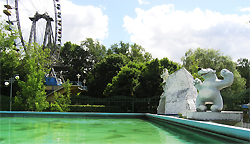RIA Novosti: Moscow Is for Writers

(RIA Novosti – Natalia Antonova – October 29, 2013) Natalia Antonova, is the acting editor-in-chief of The Moscow News. She also works as a playwright her work has been featured at the Lyubimovka Festival in Moscow and Gogolfest in Kiev, Ukraine. She was born in Ukraine, but spent most of her life in the United States. She graduated from Duke University, where she majored in English and Slavic Literature.
The other day, a famous writer asked me why I came to Moscow. I had trekked across construction mud and broken pavements to see him at the central Moscow radio station where he is hosting a program and with dark clouds gathering outside and a rainstorm coming in, the question seemed particularly pertinent. It also seems pertinent to ponder in my final Trendwatcher column to produce a kind of lasting message, a mark in time.
Moscow is not easy. I don’t mean that in any overarching, existential sense it’s just not easy to get from Point A to Point B, not easy to deal with paperwork (those tiny, airless rooms out of which the local bureaucracy operates can make you long for the apocalypse), not easy to endure the weather, and certainly not easy to keep up with the breakneck pace at which new legislation is adopted (legislation that does, in fact, have a direct impact on people’s lives just look at what happened when Russia decided to permanently stay on summer time! Dark mornings like something out of Sauron’s bag of tricks).
I’m not even going to go into detail about visas, housing prices, registration, traffic, riots or corruption. What would be the point? I could write an entire series of books based on each topic alone, and they would be filled with much lamentation.
On a personal level, my life was much easier before I came to Moscow. Getting married and having a child is certainly a big part of why I rarely sleep or eat anymore, but there is more to it. The topography of my existence used to be more predictable. Nowadays, my life is one giant Sergei Yesenin quote: “You didn’t know / That in the blinding smoke / In a life mangled by the storm / I am tortured precisely because I can’t understand / Where the fateful events are carrying us to.”
The really scary thing is that I can easily picture a parallel life for myself a media job somewhere back in the States, a more or less predictable husband (I married a Russian theater director-turned-filmmaker, which is probably everything you need to know right there), a mortgage, a dog, no kids yet because kids are expensive and one has to be sensible about that sort of thing, a car loan, a monthly cell phone plan, some sense of quiet rhythm.
I see that person I could have turned out to be at this point in time and I see her at the windows of her warm and hospitable home, staring at a storm outside with something like longing etched into her face. To put it in less flamboyant language the Moscow I know now, or some imaginary version thereof, would still be in that direction at which the needle in my internal compass would stubbornly point to. There is a fatalism to that, I guess, but to paraphrase Gandalf, not all fatalism is an evil.
Shaun Walker, The Guardian’s current Moscow correspondent, recently celebrated a decade in the city. Like me, he is one of those English-language journalists who both ridicules and celebrates Moscow, gapes in awe at the ridiculous for-rent ads and bad roads, and still can’t help but point out that this is still one of the best cities ever.
I don’t know how long Moscow will last for me. So unpredictable is my life here that I sometimes have to seriously wonder whether I’ve made it all up inside my head (much as Milton’s version of God pretty much makes up the entire universe as a kind of story he hums along).
That, I suppose, is the real answer for why I came here. Moscow is for people who make things up for writers, in other words. It’s why they have always thrived here, even if they weren’t exactly thriving in the traditional sense of the word. It’s why you can end up having an actual philosophical debate with someone on the metro at 5:30 a.m. here, and not feel the least bit self-conscious about it.
Moscow is a place where your soul feels only loosely tethered to your body. People are rubbed raw here and exposed for what they are. The buildings are enormous and brooding, the parties feature guests with such gravity that they appear to slow down time around them, the waiters all have superior life philosophies, conversation is never casual, and nothing is ever a coincidence.
If there is one “trend” I can tease out from all of that, it is the trend toward the unexpected sublime like stumbling into a puddle at some unholy hour in the city and briefly feeling the actual galaxy all around you wheeling by, and you wheeling in it, both helpless and hopeful, for as long as you both can last.
